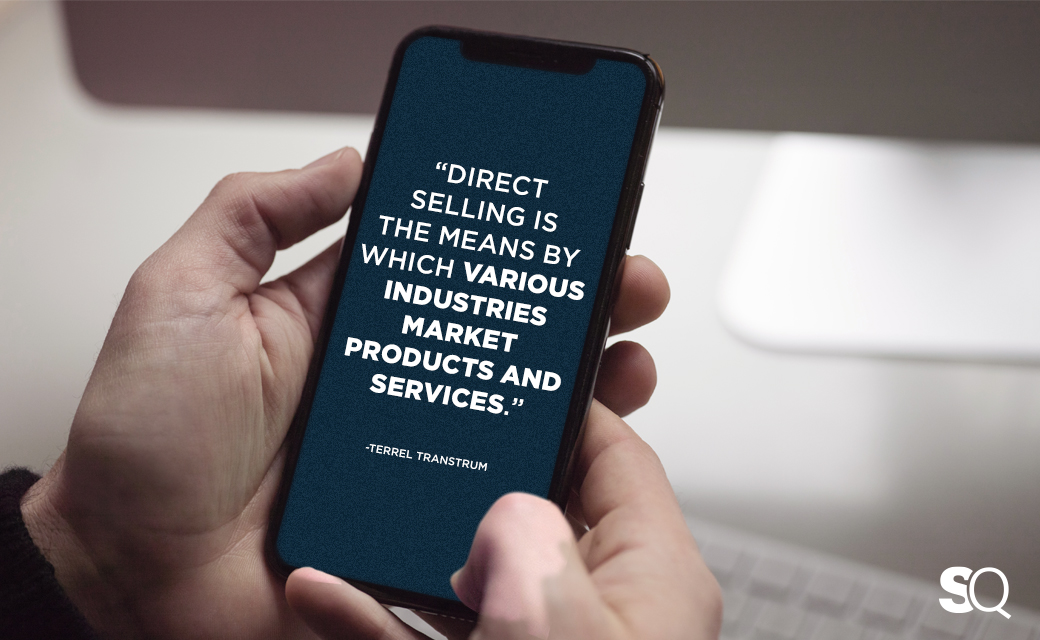Direct selling or MLM companies are often categorized as an industry.
In this article, I’ll share why I believe this is an incorrect and even, harmful, description.
Think Direct Selling Products and Services
Commerce seeks to solve the problem of a human’s wants and needs. When a product solves your problem, it is a good thing. We’re thankful for the product we purchased, it wasn’t only good it was necessary!
All things that are good have an evil twin.
Scam artists masquerade as legitimate direct selling or MLM companies. They target consumers with false promises of financial independence. These companies trade on malice, with clever marketers who give very little to no value in return.
When companies with products prop up promises of income glory, law enforcement responds.
Regulatory effort must protect consumers who may feel financial instability or unemployment pressure. A more informed classification of direct sales may help define good commerce. That could, in turn, enhance work against scam tactics.
What is an Industry?
-
Mining
-
Farming
-
Fishing
-
Teaching
-
Nursing
-
Engineering
Research and development, technology, and transportation represent specific classes. However, direct selling incorporates an entire spectrum of industries from wellness, personal & home care. It may also include:
- clothing & accessories
- leisure & educational
- services such as consumer finance & legal services

Direct selling is the means by which various industries market products and services. The common factor? Marketing, sales, and distribution methods. Not products and services offered.
The DSA and FTA refer to the marketing, selling, and distributing of products as the “direct selling industry.”
In their own publications they talk about diversity of the “industry” products and services. But they still define dissimilar companies as an industry. The DSA publishes regular reports such as “Industry Fact Sheet.” They also report, “Consumer Trends Impacting the Direct Selling Industry.” The FTC states that “Multi-level marketing is a diverse and varied industry.”
Business owners must consider whether direct selling is an industry or distribution channel.
What is a channel?
Let’s consider the example of Melaleuca. They are a prominent direct sales company but they’ve insisted they are not an MLM.
Melaleuca distanced itself from MLM by declaring it a consumer-direct company. Melaleuca created a channel to move products to consumers through affiliates.
At $3 billion in annual revenue, Melaleuca pays multi-tiered, or multi-level income. Their plan compensates its sales organization to most sales incentive programs.
While Melaleuca fits the industry definition of an MLM enterprise, it is not an MLM company.
What about companies that escape regulatory scrutiny because it doesn’t fit a direct selling mold? They lack the industry label, yet pay commissions like direct selling companies?
Insurance, real estate, automobiles, or other products sellers receive a commission. Yet, many people in their sales chain receive compensation for their effort.
In this case, “direct sales” as an “industry” doesn’t stand. It only draws unnecessary scrutiny from regulators.
Example 1 – Kenny Marsden | Automobile Salesman at Timberline Auto Sales. Kenny is on the sales floor and works with walk-in customers. He also keeps a notebook and is always prospecting. Kenny only gets paid if he sells a car.
-
- His receives is a 25% commission on gross profit minus “pack.” Pack is the amount that the business takes first, after cost. If he sells a used car for $3,000 over cost, and the “pack” is $800, then Kenny gets 25% of ($3,000 minus $800) or $550. Kenny pays for $50 gift cards to people who refer a sale to him, as long as the sale happens.
- A new car sale calculates differently. He will only get $75 to $150, depending on his sales performance.
- If he sells more than his monthly quota of 8 cars, he will see his commission rate go as high as 30% to 35%.
- If he sells a car through the Internet, he receives a flat fee of $100 regardless of gross profit.
- Elizabeth is Kenny’s team manager. Elizabeth has a sales team of 8 – 10 people, and she receives 10% on everything her team sells. She gets a flat fee of $25 on a sale made through the Internet by her team. Elizabeth can also earn sales commissions on her own sales. But she is careful to not interfere with the sales team. She sees her job more as being available to help them succeed.
- Elizabeth answers to Quinn who as the store manager receives a commission on the total sales. Natalie is the regional manager who receives a commission on total sales made by her region. The owner is also compensated when the enterprise is profitable. In total, there are six levels of commissions paid on the sale of a car.
- Elizabeth and her sales team receive IRS 1099 forms for year-end tax reporting. Quinn and Natalie are W-2 employees who also receive sales performance commissions.
Example 2 – Todd Harper | Sales Rep for Malaleuca. Todd Harper is selling personal care and nutritional products. He sets his own hours and doesn’t work in a fixed location. He keeps a notebook and is always prospecting. This is because he only gets paid if he finds a customer and makes a sale.
-
- His formula is 7% on product sales to his customers. Many of his customers are repeat customers, so he gets paid each time they buy products.
- Todd also receives 7% on what his sales team produces. As he expands his sales team, Todd can receive higher percentages on customer sales.
- Jeff is Todd’s group manager. Jeff has a sales team of 10 to 12 people. He also receives a percentage of the sales of his expanded team. In total, the plan pays 2 to 7 levels of commission, depending on who qualifies for commissions.
- Todd, Jeff, and their sales team receive IRS 1099 forms for year-end tax reporting.
Read how to build the best MLM Compensation Plans right here.
Many other companies can describe their methods of selling their products and services in the same way.
When the sales of products and services are the focus, regulators allege true market demand is insufficient.
In other words, “income creation” is the ultimate output of the “direct selling industry.”
Does the Customer Win?
Ask yourself, is the emphasis on the sale to non-participating customers? Good commerce connects a problem-solving product to happy customers. In other words, direct selling or MLM companies are not an “industry” but a “channel.” Companies partner with independent contractors who receive a commission through the channel.
This becomes problematic. When regulators decide to declare that the products or services that prop up the sales program are either incidental or tainted. They can then question the market demand.
Direct sales is a marketing and sales channel. It is in its simplest form a means by which to move products and services into the hands of consumers.
Is direct selling industry or a marketing channel? For me, it’s a marketing channel. Direct sellers can produce an income selling products to consumers through the channel.




